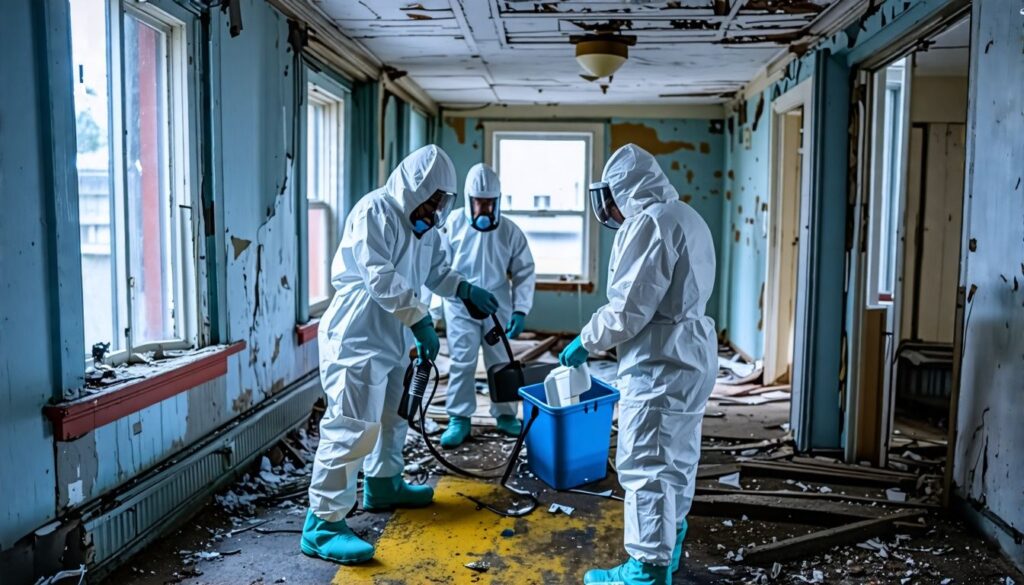Asbestos has been recognized for decades as a serious health risk when its fibers become airborne and inhaled. Despite regulations limiting its use in construction, many older buildings still contain asbestos-containing materials. Detecting these hidden hazards is essential for property owners, buyers, and contractors to ensure safety and compliance with regulations. Reliable asbestos test services play a critical role in identifying and managing asbestos test risks before any renovation, demolition, or even routine maintenance activities take place.
Understanding asbestos and its dangers
Asbestos refers to a group of naturally occurring fibrous minerals once widely used in construction and manufacturing. Its fire-resistant, insulating, and durable properties made it a popular choice for roofing, insulation, flooring, pipes, and walls. However, asbestos fibers are extremely hazardous when disturbed.
Exposure occurs when asbestos-containing materials are cut, drilled, sanded, or broken, releasing microscopic fibers into the air. Inhalation of these fibers can lead to severe health issues, including asbestosis, lung cancer, and mesothelioma. These diseases often develop years or even decades after exposure, emphasizing the importance of early detection and prevention.
The purpose of asbestos testing
Asbestos testing involves identifying whether materials in a building contain asbestos and assessing the level of risk associated with them. The process provides vital information to property owners and contractors, helping them make informed decisions about management or removal.
Testing is not only crucial for health and safety but also for legal compliance. Many jurisdictions require asbestos testing before renovations, demolitions, or property sales, making it an essential step in responsible property management.
Types of asbestos testing services
Reliable asbestos test services offer a range of options depending on the needs of the property and project. The main types of asbestos testing include:
Bulk sampling
Bulk sampling involves taking small samples of materials suspected to contain asbestos, such as insulation, flooring, or ceiling tiles. These samples are then sent to a certified laboratory for analysis to determine whether asbestos is present and, if so, what type.
Air monitoring
Air monitoring is performed to measure the concentration of asbestos fibers in the air, particularly in buildings where asbestos-containing materials may have been disturbed. This type of testing is important for assessing the immediate risk to occupants and workers and ensuring that safety measures are effective.
Surface sampling
Surface sampling is conducted to check for settled asbestos dust on surfaces within a building. This type of testing is often used in post-remediation inspections to verify that cleaning procedures were successful and that the area is safe for occupancy.
The testing process
Professional asbestos test services follow strict procedures to ensure accuracy and safety. The typical process includes:
- Initial assessment – Experts inspect the property to identify areas likely to contain asbestos. This involves reviewing building plans, examining construction materials, and noting the age of the structure.
- Sample collection – Trained technicians carefully collect material samples or perform air monitoring without disturbing asbestos fibers unnecessarily. Protective equipment and containment methods are used to prevent contamination.
- Laboratory analysis – Samples are sent to accredited laboratories where specialized techniques, such as polarized light microscopy (PLM) or transmission electron microscopy (TEM), are used to confirm the presence and type of asbestos.
- Reporting – Results are compiled into a detailed report outlining the findings, locations of asbestos-containing materials, and recommendations for management or removal.
Importance of certified and reliable services
Asbestos testing is a specialized task that requires expertise and proper certification. Using certified professionals ensures that the testing is accurate, legal, and safe. Untrained individuals attempting to test or handle asbestos risk contaminating the area and exposing themselves or others to hazardous fibers.
Reliable services also provide documentation that is often required for compliance with local regulations or property transactions. A detailed report from a certified provider ensures that property owners can demonstrate due diligence in managing asbestos risks.
Managing asbestos after testing
Once asbestos is detected, property owners must decide on the appropriate course of action. Options typically include:
Professional removal
Licensed asbestos removal contractors can safely remove asbestos-containing materials using specialized equipment and procedures. This is often necessary in cases where renovation or demolition will disturb the materials.
Encapsulation
In some cases, asbestos materials may be safely managed without removal. Encapsulation involves sealing or coating the material to prevent fibers from becoming airborne. This method is typically used when the asbestos is in good condition and will not be disturbed.
Regular monitoring
For properties with asbestos that remains in place, regular monitoring is essential to ensure the materials remain stable and do not pose a risk over time. Periodic inspections help identify any damage or deterioration that may require action.
Legal and regulatory considerations
Many countries enforce strict regulations for asbestos management. Testing and proper handling are often legally required before renovations, demolitions, or property sales. Failing to comply can result in fines, legal liability, and even project delays.
Certified asbestos testing services ensure that all procedures meet legal standards. Their reports provide official documentation that demonstrates compliance and protects property owners from potential liabilities.
Health and safety benefits
The most critical benefit of reliable asbestos testing is protection from health risks. Early detection prevents exposure to airborne fibers that can lead to serious, long-term diseases. Workers, occupants, and the surrounding community are all safer when asbestos hazards are properly identified and managed.
Testing also reduces environmental contamination. Improper handling of asbestos can release fibers into the surrounding area, affecting neighbors and the wider environment. Professional testing ensures that risks are identified and mitigated effectively.
Choosing the right testing service
When selecting an asbestos test service, it is important to consider several factors:
- Certification – Ensure the service provider is certified and follows recognized standards.
- Experience – Look for companies with a proven track record in testing and reporting.
- Comprehensive reporting – The report should clearly identify locations, types, and conditions of asbestos materials, along with recommended actions.
- Safety protocols – Confirm that technicians use proper protective equipment and containment methods during testing.
Reliable providers will also offer guidance on next steps, including removal, encapsulation, or ongoing monitoring. This ensures a comprehensive approach to asbestos management.
Cost considerations
Asbestos testing is an investment in safety and compliance. Costs vary depending on building size, number of samples, and testing methods required. While there is an upfront expense, it is small compared to potential medical, legal, and remediation costs associated with asbestos exposure.
Investing in professional testing is also a proactive step that protects property value. A documented asbestos report can facilitate property sales or renovations by demonstrating responsible management of hazards.
Long-term benefits
Reliable asbestos testing provides long-term benefits beyond immediate safety. Property owners gain peace of mind knowing that hazards have been identified and managed appropriately. Detailed reports can be referenced in future renovations, maintenance, or property transactions.
Furthermore, early detection and management prevent costly and dangerous exposures, ensuring a safer environment for all occupants and workers over the building’s lifespan.
Raising awareness about asbestos risks
Despite the known dangers, many property owners remain unaware of asbestos hazards in older buildings. Awareness campaigns and education efforts highlight the importance of testing, proper management, and professional involvement. Reliable asbestos testing services contribute to these efforts by providing clear, actionable information.
Educating building owners, contractors, and maintenance personnel ensures that asbestos risks are not overlooked and that proper safety measures are consistently applied.
Conclusion
Reliable asbestos test services are a critical component of property safety and compliance. By detecting hidden asbestos hazards, these services protect health, prevent legal issues, and guide safe renovation, demolition, or maintenance practices.
Professional testing ensures that asbestos-containing materials are identified accurately, managed responsibly, and removed or encapsulated when necessary. For property owners, buyers, and contractors, investing in certified asbestos testing is not only a legal requirement in many areas but also a fundamental step toward ensuring long-term safety and environmental responsibility.
By prioritizing reliable asbestos testing, individuals and organizations demonstrate a commitment to protecting lives, property, and communities from the dangers of asbestos exposure.







